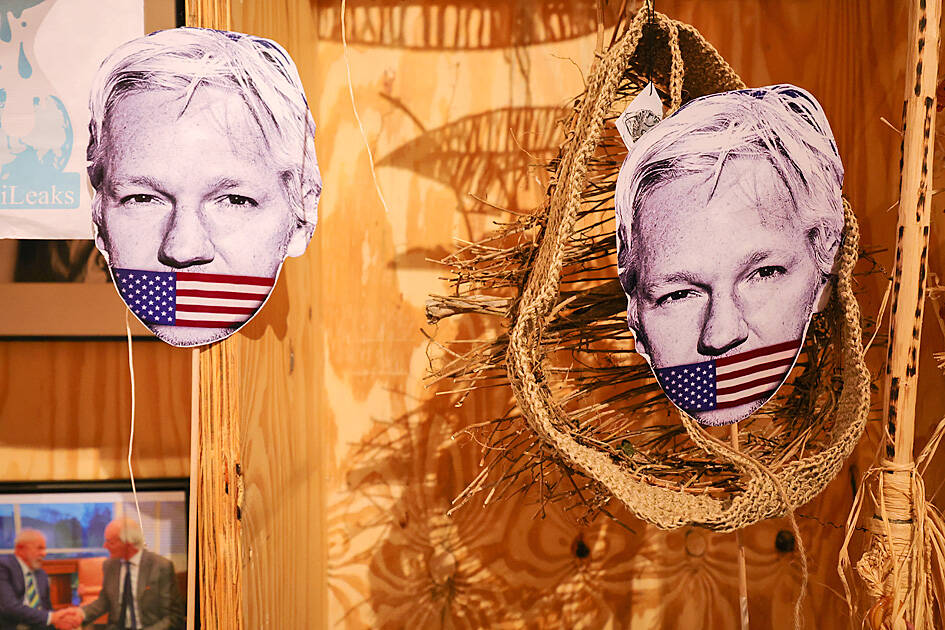A cross-party delegation of Australian lawmakers yesterday said they had met US Ambassador Caroline Kennedy, urging her to help drop the pending extradition case against WikiLeaks frontman Julian Assange and allow him to return to Australia.
The “Bring Julian Assange Home Parliamentary Group” said it had informed the US envoy of “the widespread concern in Australia” about the continued detention of Assange.
“There are a range of views about Assange in the Australian community and the members of the Parliamentary Group reflect that diversity of views. But what is not in dispute in the Group is that Mr Assange is being treated unjustly,” the lawmakers said in a statement after meeting Kennedy in Canberra.

Photo: EPA-EFE
Assange, an Australian citizen, is battling extradition from Britain to the US, where he is wanted on criminal charges over the release of confidential US military records and diplomatic cables in 2010. Washington says the release of the documents had put lives in danger.
Assange’s supporters say he is an anti-establishment hero who has been victimized because he exposed US wrongdoing, including in conflicts in Afghanistan and Iraq.
The US embassy in Australia confirmed the meeting in a tweet, but did not share further details.
Assange’s brother, Gabriel Shipton, said he felt the meeting was an “important acknowledgement” by the US government that “Julian’s freedom is important to millions of Australians.”
After Australian Prime Minister Anthony Albanese “expressed frustration with the Biden administration, this is now a test for Ambassador Kennedy to see if she can move Washington on this issue,” he said, referring to US President Joe Biden.
Albanese, who has been advocating for the release of Assange, last week aired his frustration for not yet finding a diplomatic fix over the issue.
Support for Assange among US policy makers remains low. Only a few members of the US Congress have come forward in support of the demand to drop charges against him.
If extradited, Assange faces a sentence of up to 175 years in a maximum security prison.

ANGER: A video shared online showed residents in a neighborhood confronting the national security minister, attempting to drag her toward floodwaters Argentina’s port city of Bahia Blanca has been “destroyed” after being pummeled by a year’s worth of rain in a matter of hours, killing 13 and driving hundreds from their homes, authorities said on Saturday. Two young girls — reportedly aged four and one — were missing after possibly being swept away by floodwaters in the wake of Friday’s storm. The deluge left hospital rooms underwater, turned neighborhoods into islands and cut electricity to swaths of the city. Argentine Minister of National Security Patricia Bullrich said Bahia Blanca was “destroyed.” The death toll rose to 13 on Saturday, up from 10 on Friday, authorities

OPTIMISTIC: A Philippine Air Force spokeswoman said the military believed the crew were safe and were hopeful that they and the jet would be recovered A Philippine Air Force FA-50 jet and its two-person crew are missing after flying in support of ground forces fighting communist rebels in the southern Mindanao region, a military official said yesterday. Philippine Air Force spokeswoman Colonel Consuelo Castillo said the jet was flying “over land” on the way to its target area when it went missing during a “tactical night operation in support of our ground troops.” While she declined to provide mission specifics, Philippine Army spokesman Colonel Louie Dema-ala confirmed that the missing FA-50 was part of a squadron sent “to provide air support” to troops fighting communist rebels in

Two daughters of an Argentine mountaineer who died on an icy peak 40 years ago have retrieved his backpack from the spot — finding camera film inside that allowed them a glimpse of some of his final experiences. Guillermo Vieiro was 44 when he died in 1985 — as did his climbing partner — while descending Argentina’s Tupungato lava dome, one of the highest peaks in the Americas. Last year, his backpack was spotted on a slope by mountaineer Gabriela Cavallaro, who examined it and contacted Vieiro’s daughters Guadalupe, 40, and Azul, 44. Last month, the three set out with four other guides

Local officials from Russia’s ruling party have caused controversy by presenting mothers of soldiers killed in Ukraine with gifts of meat grinders, an appliance widely used to describe Russia’s brutal tactics on the front line. The United Russia party in the northern Murmansk region posted photographs on social media showing officials smiling as they visited bereaved mothers with gifts of flowers and boxed meat grinders for International Women’s Day on Saturday, which is widely celebrated in Russia. The post included a message thanking the “dear moms” for their “strength of spirit and the love you put into bringing up your sons.” It